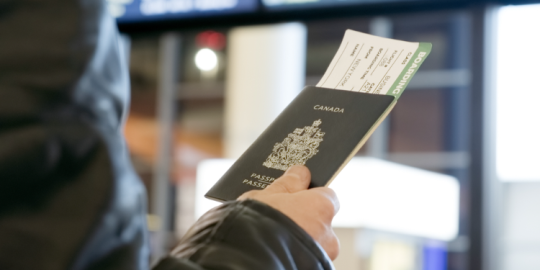What are the benefits of permanent residency?
The list of advantages of becoming a permanent resident (PR) in your expat country is not short. Of course, it all ultimately depends on the country where you are, the country you come from, and what your long-term goals are.
For one, being a permanent resident will make it much easier to travel in-and-out of your expat country. As the British immigration attorney Davidson Morris says, permanent residents of the UK can travel out of the country for 2 years. While they still risk losing their residency if they remain out of the UK for longer than this, 2 years is usually enough for long trips back home to take care of matters such as a relative's health or the sale of a piece of land or even to study for a postgraduate degree in a third country.
In many countries, permanent residents can also sponsor their close relatives to join them. In Canada, permanent residents can not only sponsor their spouse and children, but they can also bring their parents and grandparents under the Parent and Grandparent Program or the Super Visa. In comparison, in the US, Green Card holders can usually only sponsor their spouse and unmarried children. They need to become citizens to sponsor their parents and grandparents.
Getting permanent residency might also make it easier to switch jobs and study in the country. If you first entered a country with a temporary work visa for a specific profession and/or with a specific employer, your ability to stay in the country is dependent on remaining with the same company or at least in the same field of work.
Be careful, though; being a permanent resident rather than a citizen might still make you subject to some restrictions here. Permanent residents who obtained their Green Card thanks to the sponsorship of an employer may not be able to switch employers too quickly or switch to a job that is vastly different from their current one. The immigration lawyer Carl Shusterman says that doing so will make the US immigration authorities suspicious as to why they applied for the initial job.
For expats who want to pursue further studies, switching residency will save them a lot in tuition fees. Becoming a permanent resident is usually enough to start paying domestic rather than international tuition fees. In Australia, the most expensive study-abroad destination in the world in 2022, according to an HSBC survey, international postgraduate students pay an average of 32,000 AUD (22,000 USD) per year. A permanent resident qualified as a domestic student will have up to 75% of that cost subsidized by the Australian government.
Permanent residents can enjoy other social benefits provided by the state. For example, in Canada, they enjoy the free healthcare system and do not require medical insurance anymore. They pay lower property purchase tax. In Canada, again, buying or selling property in Ontario while not being a permanent resident yet will make you incur a speculation tax of 25%. Permanent residents, meanwhile, are not subject to this NRST (Non-Resident Speculation Tax).
And, of course, permanent residency is the first step to applying for citizenship. In most countries, expats can apply for citizenship after having been permanent residents for 5 years. In the UK, expats can do so after only 1 year as permanent residents, as long as they were living in the country for an additional 4 years under another status.
What are the risks associated with switching to permanent residency?
After this long list of advantages, you might be wondering, are there any disadvantages to applying for permanent residency? The biggest risk is fiscal, especially if you don't research the taxation laws of both your home country and expat country well. You might trap yourself into paying higher taxes or having to file two tax returns.
This is especially tricky for US citizens, who are taxed by the Internal Revenue Service (IRS) on their worldwide income irrelevant of where they're living – even if they've become residents of multiple countries or dual nationals. American expats who've either lived in another country for at least 183 days or acquired permanent residency cannot forgo the duty to disclose their worldwide income to the IRS every year.
There are tax treaties in place to prevent American expats from being taxed on the exact same income twice, but they still need to go through the bureaucratically complex process of compiling a global portfolio of their income and assets, consulting a tax specialist, and filing forms like the FBFA (Foreign Banks and Financial Accounts) and FACTA (Foreign Account Tax Compliance Act).
Expats from other countries who decide to become permanent residents in the US also become bound by this. For instance, an Indian expat with a Green Card is now obliged to disclose any earnings he gets from India (e.g., rent from family land) as well as the amount of money in his/her overseas Indian bank accounts. Even if he/she has his/her Green Card revoked at some point, he/she is not automatically freed from all tax liabilities. As the legal firm Golding & Golding explains, if the expat has held this Green Card for at least 8 out of the last 15 years, he/she is considered a “long-term resident” and might be subject to an exit tax.
H&R Block says that an exiting expat is considered to be a taxable “covered expat” if he/she has a personal net worth over $2 million at the time that he/she relinquishes his/her Green Card or if he/she has earned above a certain threshold over the last 5 years (e.g., over $171,000 in 2020). If he/she is deemed to be a covered expat, he/she will have to pay an exit tax. Many other countries have introduced a similar exit tax in recent years. In 2015, Spain decided to start levying an exit tax on expats who've been residents for 10 out of the last 15 years and own a certain amount of shares. High-earning expats should take this into consideration before deciding to switch residency.
The fiscal implications of applying for permanent residency can be a much more straightforward scenario. If you are an expat in a low-tax or zero-tax jurisdiction, moving to another country with high taxes will affect how much take-home income you get. For instance, if an expat who previously lived in the UAE moves to France in the long-term, he/she will see his/her earnings not only start being taxed but also possibly start being taxed at a very high rate (as high as 45%). Here, it will not matter if the expat has permanent residency in France or not, for as long as he/she has worked in France for 183 days, he/she will be considered a fiscal resident.
It doesn't end here, for France also taxes expats considered “tax residents” on their worldwide income, even if that overseas income is never remitted to the person in France. Before becoming either permanent residents or fiscal residents, expats should carefully check if this country taxes people on their worldwide income or not. Singapore stands in contrast to France in taxing expats only on the money they receive locally – not money that might be entering their foreign bank accounts.
It's wise to consult a tax specialist like an accountant or lawyer before switching to permanent resident status in a country. They should be able to advise you best on whether residency will be good for your financial situation or not.
















